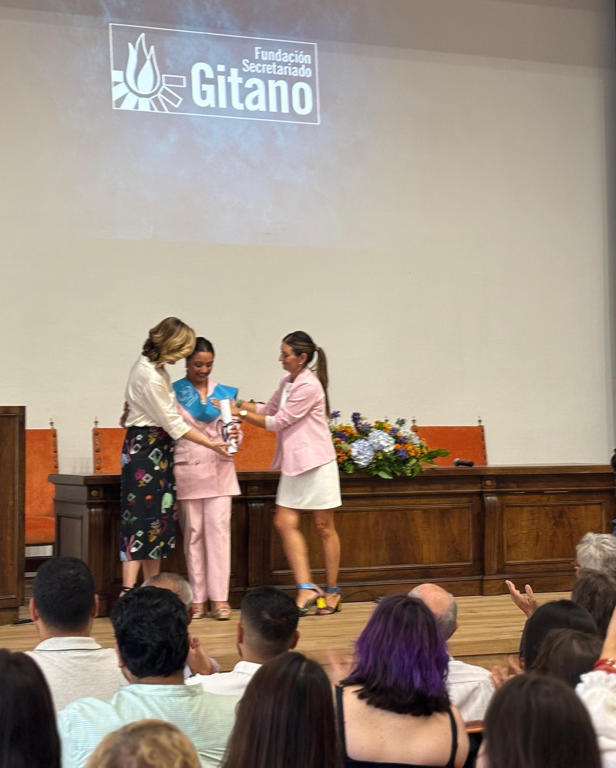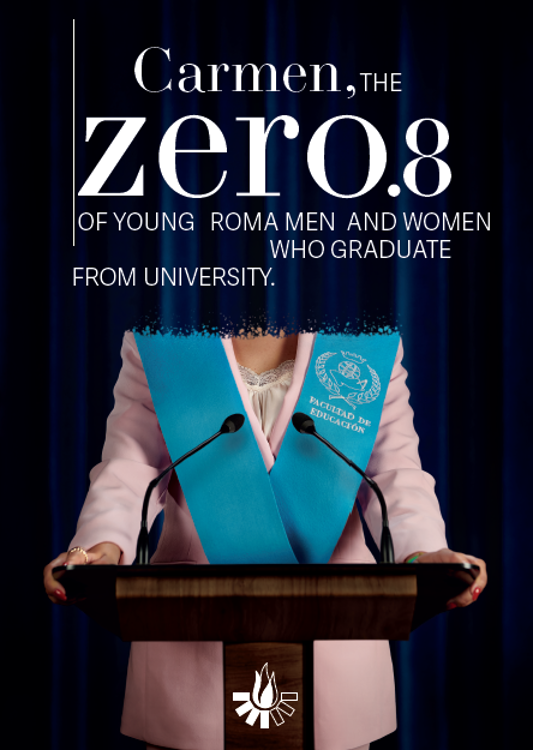Only 0.8% of Roma students graduate from university [editar]

On 27 June we presented a new social awareness and political advocacy campaign (The Zero.8) that highlights the dramatic educational situation of Roma students and calls on public authorities to take concrete actions and measures to reverse this situation and guarantee the right to education for all.
With the arrival of summer come final exams, graduations and university celebrations for the completion of studies. An educational career that many Spanish students do not manage to finish, especially when they belong to the Roma community.
The Fundación Secretariado Gitano (FSG), through the study “The educational situation of Roma students in Spain”, shares a devastating statistic: Only 0.8% of young Roma students graduate from university.
Why does this happen?
The educational path of many Roma children is conditioned by their late entry into kindergarten, the curricular gap and grade repetition, which leads to 62.8% school failure, compared to 4% for the student body as a whole.
Between the ages of 15 and 16, the majority drop out of school, without the diploma of compulsory secondary education. Moreover, the lack of educated Roma, school segregation, lack of expectations and a system that fails them, means that only 0.8% of Roma households have a member with a university degree, compared to 26% of the population as a whole. This is an alarming figure that raises the question of whether the measures for inclusion in education are the necessary ones.
To give a voice to this problem and demand measures from the public authorities, the FSG has carried out an awareness-raising and political advocacy campaign called The Zero.8, which began with a performance in evidence with the graduation of Carmen Jiménez. Carmen, a 2025 graduate in Early Childhood Education, began by giving a speech telling her testimony and making known how Roma students drop out of education with almost no one to support them to continue.
Numerous young Roma joined Carmen at the event to remember those who were left aside by the education system, those who did not have the same opportunities that Carmen had, to claim the lack of resources, support and referents.
The event was attended by different personalities representing the Roma community and representatives of the educational community, including Pilar Alegría, Minister of Education of the current government, among others.
What measures are requested?
The Fundación Secretariado Gitano calls on the education authorities:
- A specific State Plan for Guidance and Educational Reinforcement to reverse the situation of educational failure and dropout among Roma students.
- Address the school segregation that affects 1 in 3 Roma children.
- Measures to guarantee the free incorporation of Roma children in the first stages of infant education.
- Develop options for the return to formal education.
The presentation of the FSG study The educational situation of Roma students in Spain in 2023 highlighted the educational inequality affecting Roma students. Since then, the foundation has carried out various political advocacy and social awareness-raising actions to focus on the alarming data revealed by the study and to demand that the public authorities take measures to reverse this situation. NO back to school revealed that 6 out of 10 students drop out of school without finishing their studies and now Zero.8 reveals that not even 1 out of 100 young Roma people graduate from university.
According to Sara Giménez, director general of Fundación Secretariado Gitano ¨The fact that only 0.8% of young Roma have access to university is deeply alarming and reflects an educational reality that continues to be unfair and exclusive. It is urgent that the educational administrations act with concrete measures against school failure, segregation and lack of resources from the earliest stages to prevent young Roma from seeing their future limited by a system that does not guarantee equal opportunities¨.
For Carmen Jiménez, the campaign's protagonist: ¨Having managed to graduate and representing the less than 1% of young Roma who do so represents not only a personal achievement, but also a symbol of hope and a need for commitment from the institutions. It is essential to implement real policies, constant support and a change that makes education a tool for inclusion and respect for all¨
Education has been one of the FSG's priority areas for decades, with intense work with students, schools and families. Every year, the FSG assists around 5,300 students in education programmes, such as Promociona, through which more than 1,800 girls and boys receive guidance and individual educational reinforcement and which is achieving that more and more Roma boys and girls are graduating from compulsory secondary education. The aim is to multiply the number of Roma girls with higher education in the next decade.
The presentation event of the Zero.8 campaign was attended by the Minister of Education, Vocational Training and Sport, Pilar Alegría, and the Director General of the Fundación Secretariado Gitano, Sara Giménez

This campaign continues the actions that the Fundación Secretariado Gitano has launched following the presentation of the study “The educational situation of Roma students in Spain” in 2023, which shows the increase in educational inequality among Roma students. During 2024, the actions focused on denouncing the fact that two out of three students do not finish secondary education (campaign The No return to school) and now, with The Zero.8, the focus is on the fact that only 0.8% of young Roma men and women graduate from university. Not even 1 in 100.
The campaign is funded by the 0.7% programme of activities of general interest considered to be of social interest, the Equal Treatment programme, for non-discrimination of Roma people (co-financed by the European Union through the European Social Fund Plus / Ministry of Labour and Social Economy, and the Ministry of Social Rights, Consumption and Agenda 2030).





